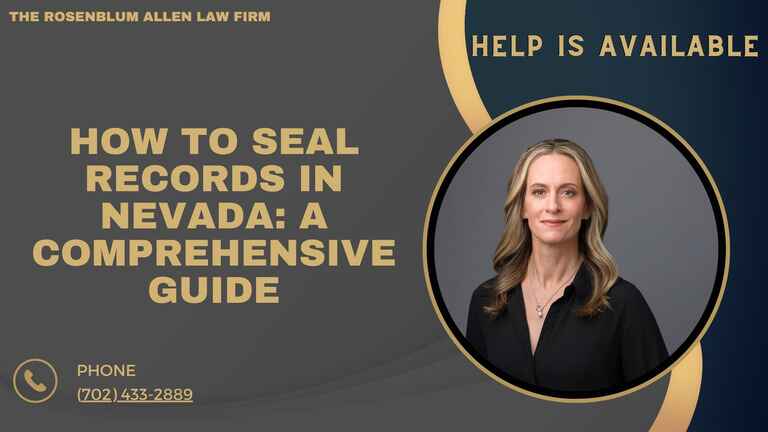Sealing records in Nevada can significantly change your life if you have a criminal history. It allows you to move forward without the constant reminder of past mistakes. This guide covers everything you need to know about sealing records in Nevada, including understanding what it means, checking if you’re eligible, and navigating the process step by step.

 Whether you’re looking to improve job prospects, secure housing, or simply regain a sense of normalcy, sealing your records could be the opportunity you need. Let’s explore how you can take control of your future.
Whether you’re looking to improve job prospects, secure housing, or simply regain a sense of normalcy, sealing your records could be the opportunity you need. Let’s explore how you can take control of your future.
What Does Sealing Records in Nevada Mean?
Sealing records means that your criminal records are hidden from public view. It’s similar to putting them in a sealed envelope that most people, including employers and landlords, can’t access. This doesn’t erase your record completely, but it keeps it private and allows you to legally say that you have not been arrested or convicted in many situations.
Difference Between Sealing and Expungement
In Nevada, records are sealed rather than expunged. Expungement completely erases the record, while sealing makes the records invisible to most. Once sealed, the records are not accessible through background checks, but law enforcement and some government agencies may still view them under certain circumstances.
Legal Implications of Sealing Records
Sealing your records offers many legal benefits:
- Improved Employment Opportunities: Employers typically won’t see sealed records in background checks.
- Better Housing Options: Sealed records can’t be used to deny you housing.
- Restoring Privacy: Your past mistakes are kept out of the public eye.
How Sealing Affects Background Checks
Once your records are sealed, they will not appear on standard background checks. This includes checks done by employers, landlords, and other non-governmental entities. Sealed records also won’t show up on most public databases.
Rights Restored After Sealing
Sealing records restores many of your civil rights, including:
- The right to vote
- The right to hold public office
- The right to serve on a jury
- Increased eligibility for certain professional licenses
Common Misconceptions About Sealing Records
- “Sealing Is the Same as Expunging”: As mentioned, sealing hides the record but doesn’t erase it.
- “Any Record Can Be Sealed”: Not all records are eligible; some serious offenses cannot be sealed.
- “Once Sealed, Records Are Gone Forever”: While sealed, some entities like law enforcement can still access them if needed.
Eligibility Criteria for Sealing Records in Nevada
Not everyone qualifies to have their records sealed. Nevada has specific eligibility requirements that must be met.
General Eligibility Requirements
To qualify, you generally must:
- Complete all conditions of your sentence, including probation, parole, and paying fines.
- Meet the required waiting period after completing your sentence, which varies depending on the offense.
Ineligible Offenses
Certain offenses cannot be sealed in Nevada. These typically include:
- Crimes against children
- Sexual offenses
- DUI involving injury or death
- Felony domestic violence after a second offense
Types of Offenses That Cannot Be Sealed
A detailed list of non-sealable offenses includes:
- Category A felonies: Such as murder, kidnapping, and sexual assault.
- Crimes against children: Including child abuse and neglect.
- Sexual Offenses: Any crime that requires registration as a sex offender.
Specific Crimes Excluded from Sealing
Here is a table summarizing the crimes that are excluded:
| Crime Type | Examples | Sealable? |
|---|---|---|
| Category A Felonies | Murder, Kidnapping, Sexual Assault | No |
| Crimes Against Children | Child Abuse, Child Endangerment | No |
| Sexual Offenses | Rape, Sexual Battery | No |
| DUI with Injury/Death | DUI resulting in serious harm | No |
Waiting Periods for Different Offenses
Different offenses have different waiting periods before you can apply to seal your records. These waiting periods start after the completion of your sentence, including any probation or parole.
Misdemeanors
- Most misdemeanors: 1 year after completion of sentence.
- DUI (first offense): 7 years after completion.
Gross Misdemeanors
- Gross misdemeanors: 2 years after completion of sentence.
Felonies
- Category B, C, or D felonies: 5 to 15 years after completion of sentence, depending on the specific offense.
Special Considerations for DUI and Domestic Violence Cases
- DUI Offenses: Special rules apply. A first offense may be sealed after 7 years, but repeat offenses often cannot be sealed.
- Domestic Violence: First offenses can be sealed after 7 years, but subsequent offenses are usually not eligible for sealing.
These eligibility rules and waiting periods are critical to understand before you begin the process of sealing your records in Nevada. Always check the specifics of your situation or consult with a legal professional to see if you qualify.

Steps to Seal Records in Nevada
Sealing your records in Nevada involves several steps. It might seem overwhelming, but breaking it down makes it manageable. Here’s how you can get started and what to expect along the way.
Preparing to File a Petition
Before you file a petition, it’s necessary to have everything in order. This preparation will save you time and help avoid any setbacks.
Gathering Necessary Documentation
The first step is to gather all the required documents. This typically includes:
- Certified Copy of Judgment: This shows the final decision from your case.
- Proof of Completed Sentence Requirements: You’ll need documents proving you’ve completed any probation, paid fines, and met other conditions of your sentence.
- Criminal History Report: This report shows your full criminal history and is needed to determine eligibility.
Verifying Completion of Sentence Requirements
Make sure you’ve completed all the terms of your sentence. This means:
- Completing probation or parole
- Paying all fines and restitution
- Fulfilling any other court-ordered requirements, like community service
Consulting with an Attorney
While it’s possible to handle the process on your own, consulting with an attorney can make a big difference. An experienced lawyer can:
- Help confirm your paperwork is accurate and complete
- Guide you through the process
- Increase your chances of a successful petition
Filing the Petition
Once you’re prepared, you can move on to filing your petition.
Where and How to File
You’ll file your petition in the court where your conviction occurred. This usually involves:
- Submitting the petition form along with all required documents
- Paying a filing fee (fees can vary by county)
Required Forms and Fees
The exact forms you need can depend on your case, but generally include:
- Petition to Seal Records: The main form to request your records be sealed.
- Order to Seal Records: A proposed order for the judge to sign if your petition is approved.
Filing fees are generally required when you submit your forms. If you can’t afford the fees, you might be able to request a fee waiver.

The Court Review Process
After you file your petition, the court will review it. This step is critical, as the judge will decide whether to approve or deny your request.
How the Court Evaluates Petitions
The court will look at several factors, including:
- Whether you meet the eligibility requirements
- Whether you’ve completed all parts of your sentence
- Any objections from the district attorney or other parties
Possible Outcomes of the Review
There are a few possible outcomes:
- Approval: The judge grants your petition, and your records are sealed.
- Denial: Your petition is denied, but you could reapply later or address the reasons for denial.
- Request for Additional Information: The judge may ask for more details or additional documentation.
Court Hearing
In some cases, a court hearing might be required. Here’s what to expect if you need to attend one.
What to Expect at the Hearing
A hearing can be a simple process, but it’s important to be prepared. During the hearing, the judge will:
- Review your case details
- Ask any necessary questions
- Listen to any objections or support from the district attorney
Presenting Your Case
If you’re required to present your case:
- Be honest and clear
- Highlight your rehabilitation and how you’ve complied with all court requirements
- Bring any additional documents that support your petition
Possible Questions from the Judge
The judge might ask questions such as:
- Why do you want your records sealed?
- Have you committed any offenses since completing your sentence?
- Are all fines and conditions of your sentence completed?
Being prepared with clear answers can help make a strong impression on the judge.
Required Documentation for Sealing Records
Getting your documents in order is one of the most important steps in the process. Let’s go over what you need and how to get it.
List of Required Documents
Here’s a checklist of the typical documents needed:
- Certified Copy of Judgment: This confirms the final court decision from your case.
- Proof of Completed Sentence Requirements: Documentation showing you’ve met all terms, such as probation completion letters and paid receipts for fines.
- Criminal History Report: A complete criminal history report from the Nevada Department of Public Safety.

How to Obtain Missing Documentation
If you’re missing any documents, you’ll need to track them down. Here’s how:
Contacting the Court Clerk
For court documents, reach out to the court clerk where your case was handled. You can:
- Visit the court in person
- Call or email the clerk’s office
- Request documents online if available
Requesting Records from Law Enforcement Agencies
For police reports or other law enforcement documents, contact the relevant police department. They might have different procedures, so it’s a good idea to check their specific requirements.
Cost of Sealing Records in Nevada
Sealing your records in Nevada involves some costs, but the investment can be well worth the benefits. Let’s break down the typical expenses so you know what to expect and how to budget for the process.
Filing Fees
Filing fees are generally required when submitting your petition to the court. These fees vary by county and can range from about $50 to over $100. The exact amount depends on the court handling your case.
Standard Fees for Sealing Petitions
- County Courts: Fees can range from $50 to $100.
- District Courts: These may charge higher fees, often $100 or more.
Fee Waivers and Reductions
If paying the filing fee is a financial hardship, you might qualify for a fee waiver. To apply for a waiver, you’ll need to fill out a financial affidavit and provide proof of income. The court will review your request and decide if you qualify for a reduction or complete waiver of fees.
Attorney Fees
Hiring an attorney can significantly increase your chances of success, but it does come with additional costs. Attorney fees vary widely based on the difficulty of your case and the lawyer’s experience.
Average Costs of Hiring an Attorney
- Simple Cases: $500 to $1,000
- More Complex Cases: $1,500 to $3,000 or more
Pros and Cons of Self-Representation vs. Legal Assistance
| Self-Representation | Hiring an Attorney |
|---|---|
| Lower Cost | Higher Cost |
| More time-consuming and complex | Easier process, less stress |
| Higher risk of mistakes | Professional guidance and experience |
| May require multiple attempts | Increased chances of success |
While you can handle the process on your own, having an attorney’s guidance can save time and help avoid common pitfalls.
Additional Costs
Besides filing and attorney fees, there are other possible costs to keep in mind.
Costs for Obtaining Required Documentation
- Certified Copies of Court Records: Often around $1 per page.
- Criminal History Report: Typically costs $27 from the Nevada Department of Public Safety.
- Mailing and Copying Expenses: Small costs that can add up if you have many documents.
Potential Costs for Court Hearings
If a court hearing is required, you might have extra costs, such as:
- Transportation: Travel expenses if the court is not nearby.
- Time Off Work: Lost wages if you need to take time off to attend the hearing.
By understanding these costs upfront, you can plan accordingly and avoid unexpected financial strain.

Common Challenges in Sealing Records
Sealing records can be a straightforward process, but it’s not without its challenges. Knowing the common obstacles can help you prepare and improve your chances of success.
Common Reasons for Petition Denial
Petitions to seal records are sometimes denied. Common reasons include:
- Incomplete or Incorrect Documentation: Missing or incorrect paperwork can lead to automatic denial.
- Outstanding Fines or Restitution: All fines must be paid before sealing is approved.
- New Offenses: Committing a new crime after completing your sentence can disqualify you from sealing your records.
Mistakes to Avoid in the Petition Process
Avoiding common mistakes can improve your chances of success. Here are some pitfalls to watch out for:
Incomplete or Incorrect Documentation
Make sure all required documents are complete and accurate. Double-check everything before submitting, including:
- Petition forms
- Proof of completed sentence
- Any additional documents requested by the court
Missing Deadlines
Being timely is key. Missing deadlines can delay your petition or result in denial. Keep track of all dates, and submit your petition as soon as you’re eligible.
How to Address Challenges and Reapply
If your petition is denied, don’t give up. You can address the reasons for denial and reapply.
Understanding Denial Reasons
Read the court’s decision carefully. It will outline why your petition was denied. Common reasons include:
- Missing documents
- Incorrect forms
- Failure to meet eligibility requirements
Steps to Improve Your Petition
Once you understand why your petition was denied, you can take steps to fix the issues:
- Gather any missing documents
- Correct any errors on the forms
- Make sure you meet all eligibility criteria
After making these changes, you can reapply. While the process can be frustrating, persistence often pays off.
After Sealing Your Records
Once your records are sealed, you’ll experience a sense of relief and newfound freedom. But what happens next? Here’s what you need to know about life after sealing your records.
What Happens Once Records Are Sealed
When your records are sealed, they are no longer accessible to the public. This means:
- Employers, landlords, and most others won’t see them.
- The sealed records won’t show up on most background checks.
However, certain government agencies and law enforcement may still access sealed records under specific circumstances.
Who Can Access Sealed Records
While sealed records are generally hidden, they can still be accessed by:
- Law enforcement agencies
- Prosecutors
- Certain licensing boards
These entities can view sealed records for specific purposes, like ongoing investigations or professional licensing.
Limitations on Disclosure
When your records are sealed, you can legally deny the occurrence of the arrest or conviction in most situations. For example:
- Job Applications: You can usually answer “no” when asked about past convictions.
- Housing Applications: Landlords typically can’t see sealed records.
- Professional Licenses: Some licenses may still require disclosure of sealed records, so check the specific rules for your profession.
Rights Restored After Sealing
Sealing your records restores many of your civil rights, making it easier to move forward with your life.
Employment Opportunities
With your records sealed, you’re no longer automatically disqualified from many jobs. This can open doors to better employment opportunities and improve your financial stability.
Restoration of Voting Rights
Sealing your records can restore your right to vote, allowing you to participate fully in civic life.

Actions to Take After Records Are Sealed
Sealing your records is a significant step, but there are still actions you should take afterward.
Notifying Background Check Companies
It’s a good idea to notify background check companies that your records have been sealed. This helps make sure that they update their databases and don’t accidentally report sealed information.
Confirming Record Sealing with the Court
Follow up with the court to confirm that your records have been sealed properly. This can help avoid any future issues with your records not being sealed as ordered.
Taking these steps after your records are sealed can help ensure that you fully benefit from this fresh start and can confidently move forward with your life.
Special Cases and Considerations
Sealing records in Nevada can vary depending on specific circumstances. Certain cases, like juvenile records or non-convictions, have their own rules. Understanding these can help you navigate the process more effectively.
Sealing Juvenile Records
Juvenile records are handled differently than adult records. The good news is that juvenile records are often easier to seal, providing a fresh start early in life.
Differences in Process for Juveniles
For juveniles, the process of sealing records is generally more straightforward. Here’s what you need to know:
- Automatic Sealing: In some cases, juvenile records are sealed automatically when the individual turns 21, as long as they have no subsequent convictions.
- Petition to Seal: For other cases, you might need to file a petition to seal the records, similar to the adult process.
Additional Protections for Minors
Juvenile records have extra protections because the law recognizes that young people make mistakes. Sealing these records:
- Keeps most employers and colleges from seeing the records.
- Helps prevent discrimination when applying for jobs, education, or housing.
- Removes the stigma of past mistakes, allowing for a clean slate.
Sealing Arrest Records Without Conviction
Not every arrest leads to a conviction. If you were arrested but not convicted, you might still have a record. Sealing these records can clear your name.
Criteria for Sealing Non-Conviction Records
For arrests that did not result in a conviction, the criteria for sealing are generally more lenient:
- No Charges Filed: If charges were never filed, you can typically seal the arrest record immediately.
- Charges Dismissed: If charges were dismissed, or you were acquitted, you can often petition to seal the record right away.
Process Differences for Arrests
The process for sealing non-conviction records is simpler and quicker:
- Gather Your Documents: Collect arrest records and documents showing the outcome of the case.
- File a Petition: Submit your petition to the court that handled your case, or where the arrest occurred.
- No Waiting Period: There’s often no waiting period if you weren’t convicted, making the process faster.
Sealing these records can protect your reputation and help avoid misunderstandings during background checks.
Sealing Records for Non-Citizens
Non-citizens face unique challenges when it comes to sealing records. Immigration status can be affected by criminal records, making it even more important to seal them if possible.
Immigration Implications
Having a criminal record, even if sealed, can still impact your immigration status. Here are key points to keep in mind:
- Background Checks: Immigration authorities might still have access to sealed records, so it’s necessary to disclose any arrests or convictions during immigration proceedings.
- Consult an Immigration Attorney: It’s highly recommended to speak with an immigration attorney who understands both criminal and immigration law to help navigate these situations.
Additional Steps for Non-Citizens
To increase your chances of successfully sealing your records as a non-citizen, you can take these steps:
- Document All Details: Keep thorough records of your case outcomes and any communications with law enforcement or courts.
- Check Eligibility Carefully: Verify that the offenses you want to seal are eligible under Nevada law, along with federal immigration guidelines.
- Seek Legal Guidance: An attorney experienced in both criminal and immigration law can provide valuable advice and help you avoid potential pitfalls.

Breaking It All Down
Sealing records in Nevada can offer a fresh start, whether you’re looking to improve job prospects, secure housing, or restore your rights. The process can be complex, but understanding each step and preparing thoroughly can make it much smoother.
Here’s a quick recap of what you’ve learned:
- Sealing records hides them from public view, giving you the chance to move forward without past mistakes holding you back.
- Eligibility varies based on the type of offense, and certain crimes are not sealable.
- Costs can include filing fees, attorney fees, and costs for obtaining required documentation.
- Common challenges include incomplete paperwork or new offenses, but reapplying after addressing these issues is often possible.
- Special cases like juvenile records, non-convictions, and considerations for non-citizens have unique rules and processes.
Taking these steps to seal your records can truly change your life. If you need help, don’t hesitate to reach out to a legal professional who can guide you through the process.
Sealing your records is more than just a legal procedure—it’s an opportunity to reclaim your future. Take the first step today and start the journey toward a brighter, unburdened path ahead.

Frequently Asked Questions
If I get my record sealed, will my arrest still appear on my background?
Your arrest will still be visible even after your record is sealed, but it will show as dismissed or acquitted rather than as a conviction. The sealing prevents the conviction itself from appearing.
Can a private company access my sealed criminal records in a background check?
No. Private companies do not have access to review sealed records. Your sealed conviction will not show up in a background check done by a private employer.
Does sealing my record in Nevada also seal it in other states?
No, sealing your record only applies within Nevada. If you have convictions in other states, you must pursue sealing in each applicable state.
If my sealed conviction shows up on a background check, can I dispute it?
You can dispute it if a sealed conviction incorrectly appears on a background check. Contact the agency doing the check and the court where it was sealed.
Do I have to list my sealed conviction on applications that ask about criminal history?
No. You can legally respond “no” if your record has been sealed if asked about criminal convictions. The purpose of sealing is so you don’t have to disclose it.
Can a sealed conviction be used against me in court in the future?
Generally, no. But there are limited exceptions if it becomes relevant to a future case at the judge’s discretion. Consult an attorney for specifics.
Will getting my record sealed improve my credit score?
No, sealing your criminal record does not directly impact your credit score or rating. It remains separate from financial histories.

More Resources for You
Molly Rosenblum, Esq., our distinguished lead attorney, has created a broad spectrum of resources to support individuals facing criminal charges. Recognizing the complexities and the significant impact of criminal law matters on individuals’ lives, these resources have been thoughtfully developed to offer guidance, clarity, and assistance during challenging times. Available through the Rosenblum Law website, these resources cover a wide range of topics within criminal defense:
Criminal Defense Attorneys: Comprehensive support for a variety of criminal charges, ensuring robust defense strategies tailored to each case. Explore the resource.
Las Vegas DUI Lawyer: Specialized guidance for DUI charges, offering expert advice and representation to mitigate the consequences of DUI offenses. Learn more.
Domestic Violence Lawyer Las Vegas: Dedicated support for individuals facing domestic violence charges, emphasizing defense strategies that protect clients’ rights. Discover the details.
Drug Possession Lawyer: Expert legal assistance for drug possession charges, helping clients navigate the legal system and seek favorable outcomes. Begin the defense process.
Sex Crimes Attorney: Specialized defense for individuals accused of sex crimes, focusing on confidentiality and aggressive legal representation. View the services.
CPS Defense Attorney: Assistance for cases involving child protective services, including child abuse and neglect allegations. Understand your rights.
Misdemeanor Lawyer: Legal representation for misdemeanor charges, aiming to reduce or dismiss penalties through effective defense strategies. Learn about misdemeanor defense.
Juvenile Defense Lawyers: Dedicated defense for minors facing criminal charges, emphasizing the unique aspects of juvenile law. Explore juvenile defense options.
Las Vegas Warrant Defense Attorney: Assistance for individuals with outstanding warrants, focusing on resolving warrants and related legal issues. Resolve your warrant.
Las Vegas Probation Violation Attorney: Guidance for probation violation issues, offering strategies to address violations and minimize consequences. Address probation issues.
Theft Crime Defense Lawyer: Defense services for theft charges, tailored to protect clients’ rights and seek the best possible outcomes. Understand theft defense.
Kidnapping Lawyers: Specialized legal support for kidnapping charges, ensuring a rigorous defense to challenge the allegations. Learn about kidnapping defense.
Firearms Lawyer Las Vegas: Expertise in firearms law, providing defense for charges related to firearms possession and use. Explore firearms law defense.
Through these resources, Molly Rosenblum, Esq. aims to offer invaluable support and legal expertise to those facing criminal charges, ensuring that individuals are well-informed and capably represented in their time of need. We encourage you to utilize these resources, ensuring that your rights are protected and your case is handled with the utmost care and professionalism.

Offsite Resources You May Find Helpful
Here are seven offsite resources that provide information about sealing criminal records in Nevada:
FindLaw: This online resource provides free legal information, a lawyer directory, and other resources on a wide range of legal topics, including the process of sealing criminal records.
Justia: Justia offers free legal information, a directory of attorneys for various legal issues, and a specific section on the expungement of criminal records.
Avvo: This website provides a directory of lawyers, including those in Nevada, legal advice, and other resources on a broad range of legal topics, including the sealing of criminal records.
Nolo: Nolo provides legal information to consumers and small businesses, including articles, blogs, FAQs, and news on the process of sealing criminal records.
LegalMatch: This online legal matching service helps individuals find lawyers in their area, including Nevada, and provides advice and resources on criminal law matters, including the sealing of records.
The Nevada Bar Association: The official website of the Nevada State Bar offers resources for finding a lawyer, including those who specialize in sealing criminal records.
Nevada Department of Public Safety: The official website of the Nevada Department of Public Safety provides information on how to apply for the sealing of a criminal history in Nevada.

A Special Message from Our Lead Attorney

Molly Rosenblum, Esq.
Thank you for taking the time to read through these resources. I understand that facing legal challenges can be overwhelming and stressful. My team and I are here to provide your guidance and support.
At the Rosenblum Allen Law Firm, we pride ourselves on our commitment to our clients, providing diligent legal representation and navigating complex legal situations with experience and professionalism.
Please don’t hesitate to contact my team and me at (702) 433-2889. Let’s discuss your situation and see how we can best assist you. We’re ready to help you take the following steps on your legal journey.
Take care,
Molly Rosenblum, Esq.




